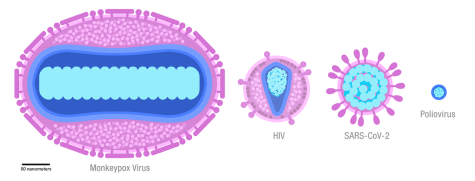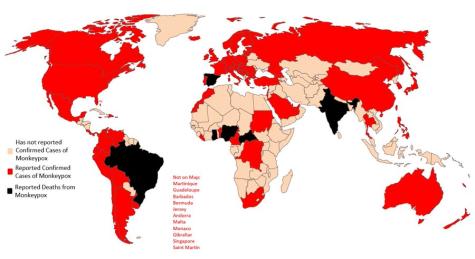Mpox

➡️ Mpox (Monkeypox) - Understanding the Current Outbreak
Mpox is a viral zoonosis - a virus transmitted to humans from animals. The symptoms are similar to those seen in smallpox, an infectious disease eradicated in 1980.
In May 2022 and then again in August 2024, after various outbreaks around the world, the World Health Organization officially declared public health emergencies, the latest of which is still ongoing. The first ever recorded case in humans was in 1970 in the Democratic Republic of Congo. This was also the location of the first sustained community outbreak in 2022. The disease has now spread to many countries outside Africa that had previously never reported mpox.
Jump straight to our guide on ➡️ Mpox
Explore our related guides on -

Initially named monkeypox due to its discovery in 1958 among laboratory monkeys, the virus historically has primarily occurred in Central and West Africa, often in proximity to tropical rainforests.
Common symptoms include fever, rash, intense headaches, back and muscle pain, and swollen lymph nodes, which can lead to various medical complications. The disease spreads through close contact with an infected person or animal.
Can Mpox be Treated?
Currently, there is no proven treatment other than supportive care of the rash, maintaining hydration, pain and fever management, and prevention of further complications.
There are vaccines for mpox, however, they are currently only being recommended for healthcare workers or those who might be at high risk of exposure. The vaccines MVA-BN and LC16m8 help prevent and reduce symptoms. Lack of vaccine equity has resulted in the stockpile of mpox vaccines in rich countries, of which the DR of Congo saw none until September 2024. 10 million doses are needed for the whole African continent to stop the spread. There is not enough capacity to manufacture the vaccines locally, and so poorer countries are left to rely on charitable donations as they are unable to afford the high prices set by pharmaceutical companies in rich nations.
Most people recover from mpox within 2-4 weeks. Preventive measures include avoiding contact with animals that could harbour the virus, especially sick or dead animals in areas where monkeypox occurs. Implementing good hygiene and infection control practices, such as washing hands regularly and using personal protective equipment, can help prevent the spread of the virus. People with mpox should stay at home during the infectious period.
Human-to-human transmission is spread through close contact. Most of the cases that were reported in the 2022 outbreak were in the gay and bisexual community. Men who have sex with other men became the most at-risk members of society. Those who have multiple sexual partners or new sexual partners are also at a higher risk.

Global Prevalence of Mpox
The prevalence of monkeypox has been primarily concentrated in central and West African countries, where it is endemic. However, outbreaks have occurred in other regions, notably in 2022, when multiple cases were reported across Europe, the Americas, and other parts of the world.
Two types of viruses cause mpox: clade I and clade II. They spread and can be prevented in the same way. Data provided by the CDC collected after January 1, 2024, confirms more than 24,000 cases worldwide across 81 locations. There have been 90 confirmed deaths.
To prevent further spread, organisations such as WHO and the CDC have focused efforts on disease surveillance, research, strengthening local healthcare capacities, infection prevention initiatives including public health education, and vaccine roll-outs.
The stigma around mpox has contributed to the prolonging of the outbreak as those displaying symptoms are reluctant to seek out treatment. Discrimination has been directed at members of the gay and trans communities, where homophobic stereotypes have been exacerbated by media reports comparing it to the early days of HIV.
We must ensure that responses to emerging and re-emerging disease outbreaks are free of stigma and that everyone has equal access to diagnosis and treatment regardless of their sexual orientation, race, gender, or any other factor.
Author: Rachael Mellor 04.02.25, licensed under CC BY-NC-SA 4.0
For more information on Mpox see below ⬇️
- Mpox (monkeypox) - WHO287514
- Mpox - CDC318209
- CDC - 2022 United States Monkeypox Case288190
- CDC - Treatment288202
- CDC - Monkeypox and Smallpox Vaccine Guidance288203
- Monkeypox - United Kingdom 5/22 - WHO287805
- European Centre for Disease Prevention and Control429088
- PAHO429097
- Medscape429101
- Gavi429103
- Africa CDC429104
- GOV.UK - Monkeypox cases confirmed in England – latest updates288191
- GOV.UK - Monkeypox vaccination288204
- Mpox - NHS 318210
- National Foundation for Infectious Diseases429099
- BBC429087
- NY Times429094
- Independent429090
- SCMP429096
- Monkeypox - BuzzFeed News Health305927
- Monkeypox - Center for Disease Control and Prevention302550
- Monkeypox - Wikipedia287802
- 2024 mpox outbreak - Wikipedia427852
- 2022–2023 mpox outbreak - Wikipedia287804
- @Monkeypoxtally - Updates on the Monkeypox and Ebola outbreak309498
- Congo faces setback in mpox response after Rwanda-backed rebels advance in the east - AP News 11.03.25460628
- Eastern DR Congo crisis increasing risk of mpox transmission, WHO chief warns - UN News 03.02.25454803
- Sierra Leone declares emergency over mpox outbreak - Al Jazeera 14.01.25450697
- Vaccine doses allocated to 9 African countries hardest hit by mpox surge: Joint press release Africa CDC, CEPI, Gavi, UNICEF, WHO - Relief Web 06.11.24439492
- DRC begins Mpox vaccination program - Borgen Project 18.10.24437433
- The Mpox Outbreak Shows We’ve Learned Nothing From COVID - Jacobin 12.09.24431932
- African nations hit by mpox still waiting for vaccines – despite promises by the west - Observer 01.09.24430693
- Africa to finally receive first batch of vaccines for deadly mpox virus - Guardian 25.08.24429588
- Watchdog Warns Mpox Vaccine Maker 'May Be Exploiting the Latest Global Health Crisis' - CD 24.08.24430269
- A Rights-Based Global Response to Mpox Emergency in Africa - HRW 23.08.24429582
- Thailand confirms Asia’s first known case of new mpox strain - Al Jazeera 22.08.24429301
- Mapped: Which countries have reported mpox cases so far? - Al Jazeera 22.08.24429275
- The new mpox variant may appear to be less deadly but it is spreading fast. Complacency would be a grave error - Guardian 22.08.24429131
- Mpox is a public health emergency — what happens now? - Nature 21.08.24430278
- Turkey’s health minister rules out extra Mpox measures for African students - Bianet 21.08.24429029
- Video: The human strain: can mpox be contained? - Economist 21.08.24428872
- Europe can defeat mpox, must support Africa in getting vaccines - UN News 20.08.24428973
- African health officials call for solidarity not travel bans over mpox outbreak - Guardian 20.08.24428644
- After COVID and Ebola, doctors take on mpox amid conflict in eastern DRC - Al Jazeera 19.08.24430202
- The global mpox emergency and the destruction of public health - WSWS 19.08.24429345
- Mpox now a global public health emergency, WHO declares, forcing countries to act - Canary 14.08.24429791
- How far has mpox spread and how can you protect yourself? - Al Jazeera 17.08.24428588
- Mpox screening stepped up globally as more cases emerge outside Africa - Guardian 16.08.24428323
- Global Health Advocates Call for Massive Mpox Vaccination Effort - CD 16.08.24429077
- “Decolonize Global Health”: WHO Declares Mpox Public Health Emergency as Africa Awaits Vaccines - DN! 16.08.24428378
- Doctors warn new mpox strain is ‘almost certainly’ in UK as Sweden detects first case - Pink News 16.08.24428305
- Is there an mpox vaccine, and how does it work? - DW 16.08.24428304
- IFRC scale up mpox response in Africa as global health emergency declared - Relief Web 16.08.24428286
- Nigeria records 39 mpox cases this year - Medical Xpress 16.08.24428303
- Pakistan becomes second country to announce possible Mpox variant case - Morning Star 16.08.24428302
- Pulling back the curtain - Science 16.08.24429177
- Tweet: Two rounds of a #polio vaccination campaign are expected to be launched at the end of August and in September across #Gaza to prevent the spread of the circulating vir…428307
- Mpox outbreak in Africa was neglected – it could now turn into the next global pandemic - Conversation 15.08.24428402
- Health ministry announces no Mpox cases detected in Turkey - Duvar 15.08.24429028
- What is mpox and why has WHO declared it a global health emergency? - Al Jazeera 14.08.24428096
- Tweet: Media briefing with @DrTedros on outcome of the #mpox Emergency Committee meeting - @WHO 14.08.24428306
- WHO declares mpox a global public health emergency - Al Jazeera 14.08.24427855
- Mpox is still being transmitted across the world, says UN health agency - UN News 13.08.24427766
- Mpox cases are soaring in Africa – what must be done to prevent a global pandemic - Conversation 13.08.24428022
- Africa CDC declares mpox a public health emergency - Al Jazeera 13.08.24427726
- WHO calls emergency meeting to discuss jump in mpox cases from DRC - Al Jazeera 07.08.24429361
- Where and why is mpox disease spreading in the DRC? - Al Jazeera 04.07.24421166
- The CDC is worried about a mpox rebound and urges people to get vaccinated - NPR 18.05.23346918
- How We Stopped Mpox This Year And What’s Next For The Disease Formerly Known As Monkeypox - BuzzFeed News 20.12.22322196
- Monkeypox given new name by global health experts - BBC 28.11.22318211
- Study shows no undetected monkeypox virus transmission before May 2022 in Rotterdam and Amsterdam - News Medical 23.11.22317106
- Monkeypox to be renamed by WHO to 'MPOX' - Washington Examiner 23.11.22317103
- Small UK study shows 78% protection from 1 dose of monkeypox vaccine - Cidrap 23.11.22317099
- UK says monkeypox vaccine is ’78% effective’ - Daily Mirror 23.11.22317105
- WHO to rename 'Monkeypox' to 'MPOX' at Biden admin's request - Fox News 23.11.22317100
- Epidemiological and clinical characteristics of monkeypox virus infection in cis and trans women and non-binary individuals - News Medical 22.11.22317102
- WHO‒recommended alcohol-based hand rub formulations show efficacy against Monkeypox virus - News Medical 21.11.22317104
- Study describes monkeypox in women; CDC warns of Tpoxx resistance - Cidrap 18.11.22317107
- Europe locks in monkeypox vaccine supply up to 2024 with Bavarian Nordic contract - Biopharma Reporter 18.11.22317101
- How monkeypox is spreading, and more — this week’s best science graphics - Nature 19.10.22311081
- Monkeypox misinformation on TikTok follows a familiar pattern, study shows - Medical Xpress 19.10.22311079
- Only seven of planned 11 monkeypox vaccination centres open, says advocacy group - Irish Examiner 19.10.22311080
- Monkeypox multi-country outbreak - second update - European Centre for Disease Prevention and Control 18.10.22312184
- Monkeypox vaccine appointments fully booked out in Ireland - GCN 18.10.22311073
- Monkeypox vaccines still aren’t reaching Black Americans - 19th News 17.10.22311075
- Monkeypox: Leading sexual health charity cuts ties with government over ‘serious concerns’ - Pink News 13.10.22311072
- Monkeypox infections in Australia stabilising, Health Minister says - Q News 26.09.22306981
- WHO releases a public health taxonomy for social listening on monkeypox conversations - WHO 26.09.22312197
- Monkeypox Appears to Recede, but Risks and Uncertainties Linger - NY Times 26.09.22306982
- Slovakia to Receive 1,400 Monkeypox Vaccines in Near Future - RSI 26.09.22306979
- How smallpox and monkeypox viruses affect the nervous system - News Medical 25.09.22306983
- Men with HIV and STIs may be at greater risk for monkeypox - LGBTQ Nation 24.09.22306984
- Youngest Monkeypox Patient Recorded in Florida; Under 2 Months Baby Marks 27th Confirmed Case in Children - Nature World News 23.09.22306990
- Will monkeypox become a pandemic? - Live Science 23.09.22306986
- MiCo BioMed gets Korea’s 1st export approval for monkeypox testing kit - Korea Biomed 23.09.22306992
- Monkeypox cases in Portugal rise - The Portugal News 23.09.22306991
- Monkeypox cases rise to 93 in Ecuador - People's Daily 24.09.22306985
- Written Statement: UKHSA advice on Monkeypox Vaccination Strategy - Wales Gov. 23.09.22306980
- Second vaccine doses to be offered to those at highest risk from monkeypox - UK Gov. 23.09.22306988
- Research identifies potential therapeutic treatment for monkeypox - Medical Xpress 23.09.22306989